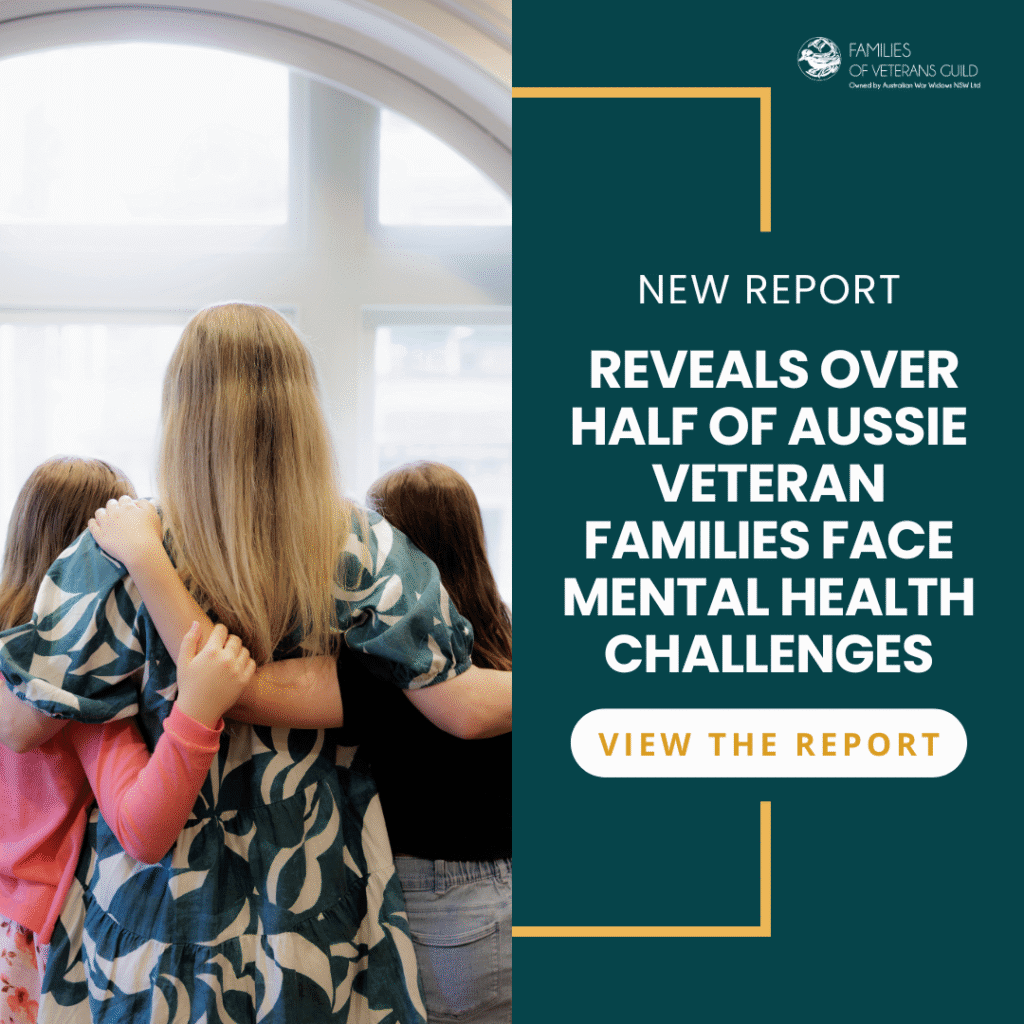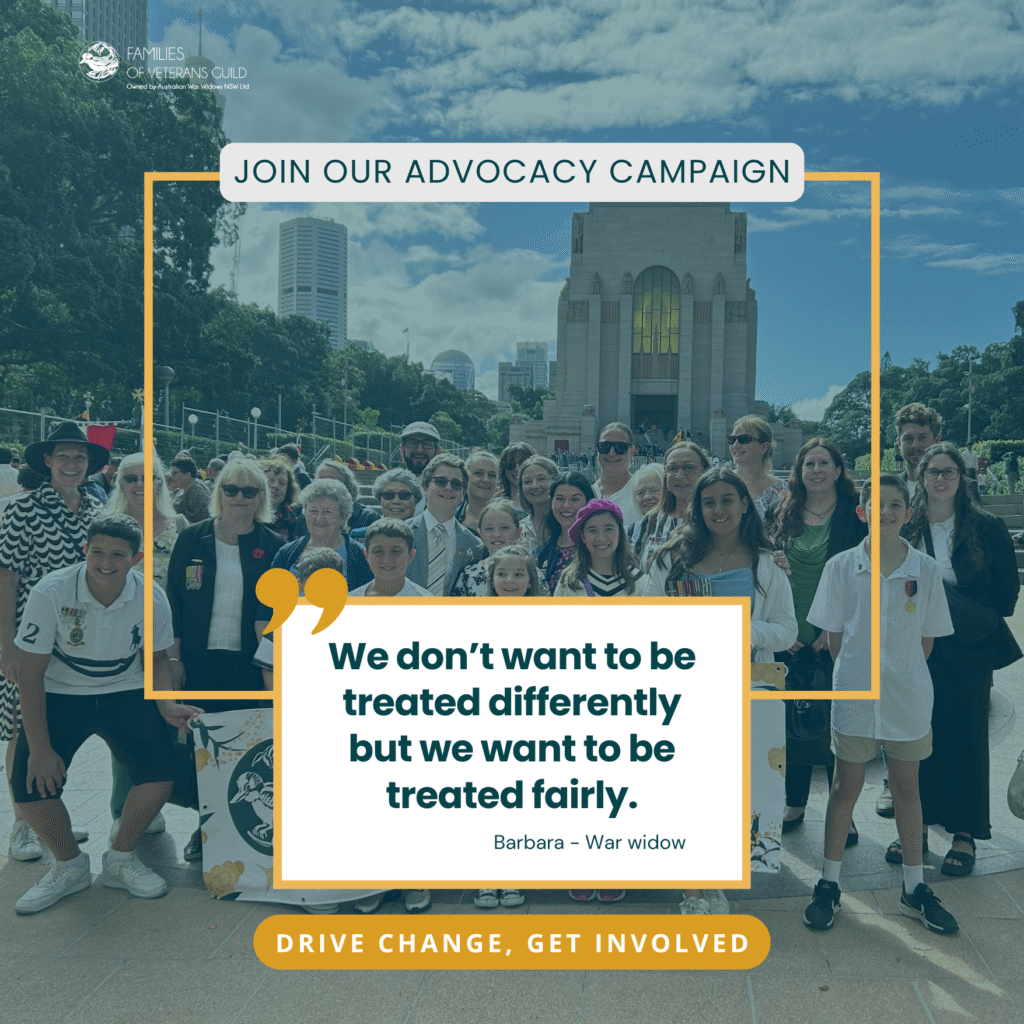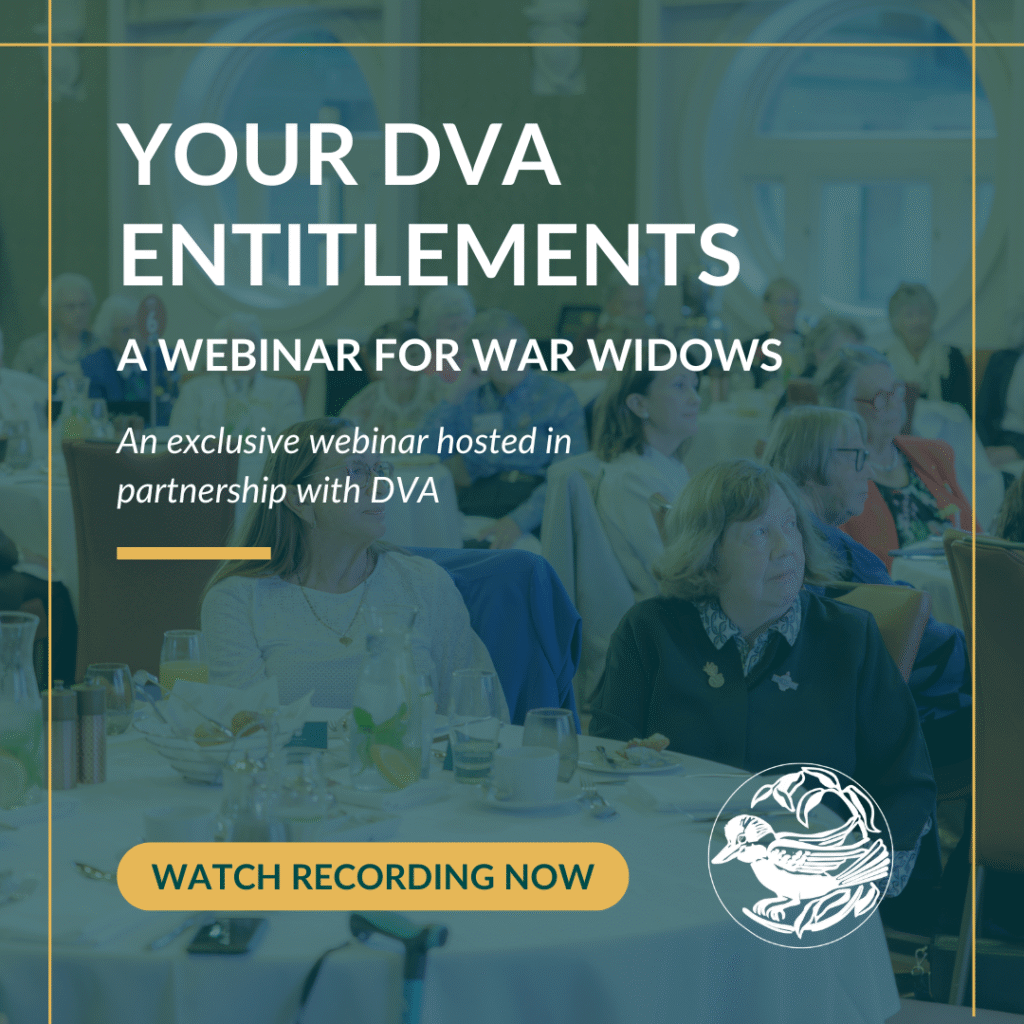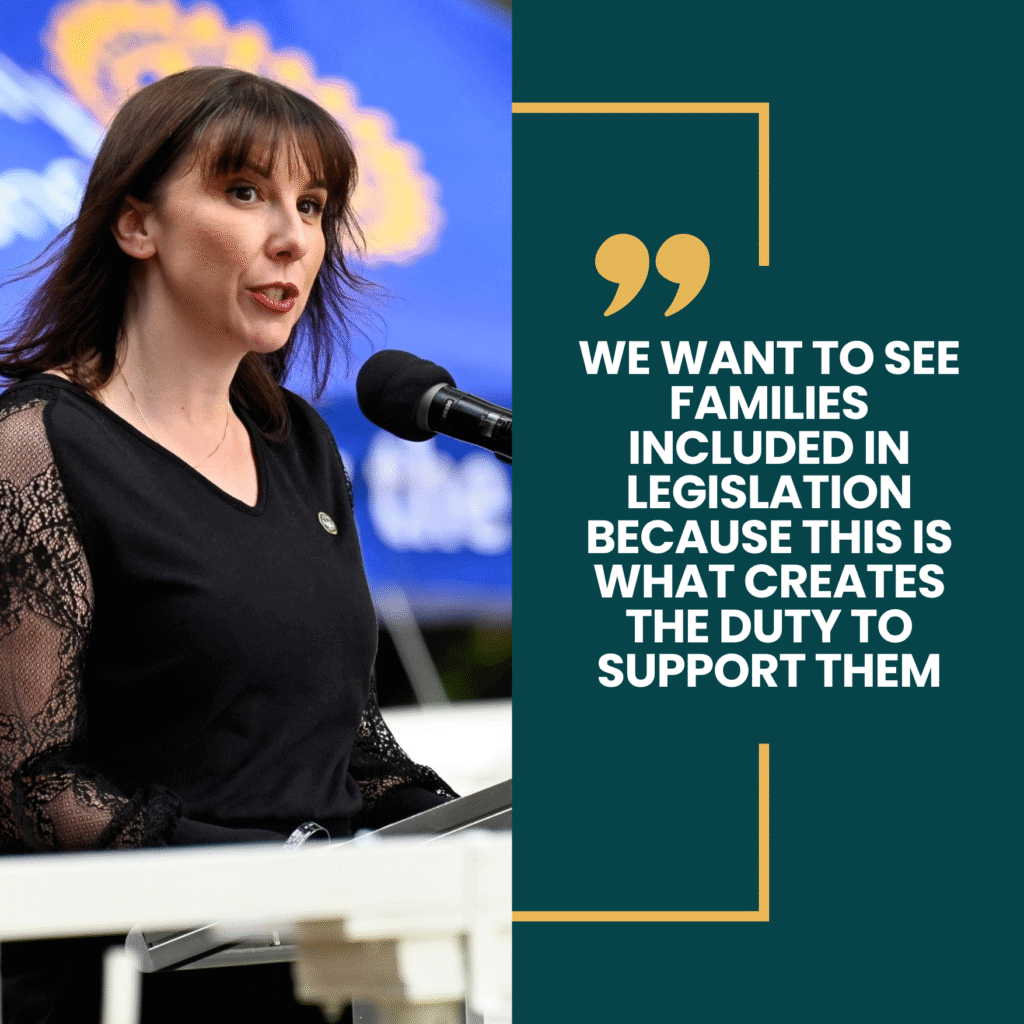Media Release – 30 October 2025
A new report released today by the Families of Veterans Guild profiles the real impact of ADF service on veteran families, including that more than half (52%) have reported mental health challenges in the last 12 months.
The 2025 Veteran Families Survey was commissioned by the Families of Veterans Guild and conducted by global research company YouGov. Surveying nearly 600 family members of current and former defence personnel, 12% of which identified as war widows [1], the research unveils the impact of service on veteran families, including significant financial stress, inadequate access to healthcare, and profound impacts on individuals’ mental health.
Life for these families is often defined by frequent relocations that disrupt schooling, friendships, and spousal careers, alongside the strain of parental absence during long deployments, making it harder for families to establish community roots and access consistent support.
Associate Professor Sean Cowlishaw from the Monash School of Psychological Sciences, a leading researcher in veteran mental health and was not involved with the survey, described the unique challenges faced by veteran families. “The impacts of service extend beyond the individual in uniform and deeply affect the whole family. They can become the primary support system, navigating complex mental health needs and behavioural changes while managing their own health and wellbeing. However, the unique needs of these families are often invisible, and it’s critical we better understand these and recognise that supporting veterans means supporting their families.”
The survey’s key findings highlight:
- Mental health challenges: More than half (52%) of veteran families have experienced mental health challenges like anxiety, depression, or PTSD in the past 12 months. They are more than twice as likely to report experiencing mental health challenges compared to the general population [2]. Worryingly, only 36% of veteran families agree that Australia’s mental health services are tailored to their unique needs.
- Barriers to healthcare: Almost half (45%) of veteran families reported difficulties accessing general healthcare services like GPs, specialists, and hospitals in the past 12 months. Among the 78% of veteran family members surveyed who have a person with a diagnosed disability or additional needs in their household, one-third (33%) of this group struggle to access the disability or specialist healthcare services they need.
- Financial and employment instability: A third (34%) of veteran family members say their household has had one or more adults experiencing unemployment and/or underemployment in the past 12 months, a rate over three times higher than the Australian average. Over half (52%) are concerned about their current financial situation.
- Barriers to accessing industry support: 54% have not accessed any of veteran support services listed in the survey in the past year (e.g., The Department of Veteran Affairs, ADF Family Health Program, Families of Veterans Guild, Open Arms, Legacy, etc.) often due to a lack of awareness or confusion about eligibility.
- Value placed on life in Defence: The report uncovered that despite the significant hardships experienced by veteran family members, there is immense pride and resilience within this community: 59% of respondents would still recommend a career in the ADF.
CEO of the Families of Veterans Guild, Renee Wilson, said the report illuminates a truth that is often overlooked, “This survey shows that the service of a veteran is a commitment shared by the entire family but families’ needs are not being met, or even acknowledged. These are not just statistics: they are real Australian families facing immense pressure.”
In response to these findings, the Families of Veterans Guild has issued five urgent policy recommendations to the Australian Government, calling for the establishment of a dedicated Ministerial advisory body for veteran families, and an Assistant Minister to focus on family policy and support.
The Guild is also advocating for the expansion of the Veteran White Card for mental health to include spouses and children of veterans. It is also urging the Government heeds the Royal Commission into Defence and Veteran Suicide’s recommendation for an immediate and independent review of Open Arms, following the high rates of suicide and mental health challenges within the veteran community, to ensure this government service is meeting the clinical needs of families.
“This report must be a catalyst for action,” urged Renee Wilson. “We have the evidence. Now we need a coordinated national response to ensure the families who sacrifice so much and enable the defence of our country are supported in every way possible.”
The report is launching this morning at a roundtable event at Parliament House in Canberra where cross party MPs will hear from a lived experience panel and discuss the report’s findings and policy recommendations for improving outcomes for this community. The report is available below.
[1] The Families of Veterans Guild defines a war widow as the partner of an ADF service member or veteran who has passed away.
[2] General population comparison: The National Study of Mental Health and Wellbeing estimates that 22% of the population (4.3 million people) aged 16–85 had experienced a mental illness in the previous 12 months, while 43% of the population (8.5 million people) had experienced a mental illness during their life. In the 12 months prior to the study, the most common mental illnesses in Australia were: Anxiety disorders (3.4 million people, or 17% of the population); Affective disorders (1.5 million, or 8%); Substance Use disorders (650,000, or 3%). Our data, whilst more general, points to a significant higher rate of mental health challenges compared to the general population.
[3] YouGov is an online market research data and analytics company. Their mission is to supply a continuous stream of accurate data and insight into what the world thinks, so that companies, governments and institutions can make informed decisions. YouGov operates in Australia, the UK, the Americas, Europe, the Middle East, India and Asia Pacific. YouGov conducts its public opinion surveys online using Active Sampling. Respondents who complete YouGov surveys will have been selected by YouGov, from its panel of registered users, and only those who are selected from this panel are allowed to take part in the survey.
About Families of Veterans Guild
The Families of Veterans Guild (under company name: Australian War Widows NSW) is an inclusive non-for-profit organisation whose mission is to provide the defence and veteran family community with a voice, facilitate access to services, entitlements and support their social and emotional wellbeing. The Guild is Australia’s only organisation that services all veteran families, including the current and former partners of Australia’s veterans.
Survey Methodology
The Veteran Families Survey was conducted by YouGov [3] online between 4 June and 23 June 2025. The sample comprised 597 Australian adults aged 18+ who are family members (including partner/spouse, child, parent, or sibling) of someone who has served or is currently serving in the ADF. Of the 597 respondents, 520 respondents were sourced from YouGov’s panel of 600,000 Australians aged 18+, while 77 respondents were sourced from Families of Veterans Guild database.
YouGov designed the questionnaire, in collaboration with the Families of Veterans Guild and its communications partner, Sefiani, part of Clarity Global.
Following data collection, YouGov weighted the data by age, gender and region to reflect the latest Australian Bureau of Statistics population estimates of the approximately 1.1 million Australian adults aged 18+ who are family members (including partner/spouse, child, parent, or sibling) of someone who has served or is currently serving in the ADF. The margin of error for this survey is +/- 3.9% at the 95% confidence level, meaning that there is a high level of confidence in the accuracy of the survey findings, but small variations are possible due to the sample size.
YouGov panel members are recruited from a host of different sources, including via standard advertising and strategic partnerships with a broad range of websites. When a new panel member is recruited, a host of socio-demographic information is recorded. For nationally representative samples, YouGov draws a sub-sample of the panel that is representative in terms of age, gender, social class and education, and invites this sub-sample to complete a survey.
Once the survey is complete, the final data sets are statistically weighted to the national profile of all adults aged 18+ (including people without internet access). Targets for the weighted data are derived from national census and publicly available datasets. YouGov uses Active Sampling to ensures that the right people are invited in the right proportions. In combination with statistical weighting, results are representative of the country as a whole.




